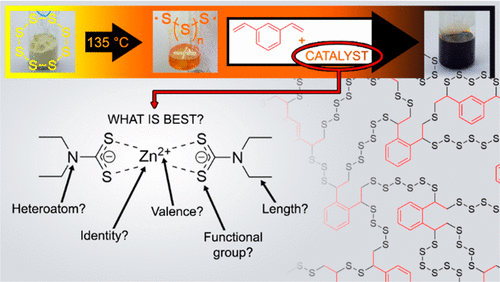当前位置:
X-MOL 学术
›
ACS Catal.
›
论文详情
Our official English website, www.x-mol.net, welcomes your
feedback! (Note: you will need to create a separate account there.)
Investigating the Role and Scope of Catalysts in Inverse Vulcanization
ACS Catalysis ( IF 11.3 ) Pub Date : 2021-03-26 , DOI: 10.1021/acscatal.0c05010 Liam James Dodd 1 , Ömer Omar 1 , Xiaofeng Wu 1, 2 , Tom Hasell 1, 2
ACS Catalysis ( IF 11.3 ) Pub Date : 2021-03-26 , DOI: 10.1021/acscatal.0c05010 Liam James Dodd 1 , Ömer Omar 1 , Xiaofeng Wu 1, 2 , Tom Hasell 1, 2
Affiliation

|
Inverse vulcanization is a potential route to the use of the large excesses of elemental sulfur, creating high-sulfur-content polymers with many potential applications. The addition of a metal diethyldithiocarbamate catalyst was previously found to bring several benefits to inverse vulcanization, making the process more attractive industrially. Herein is reported the establishment and exploration of a library of catalysts for inverse vulcanization. Three ranges of catalysts and up to 32 compounds and their combinations have been investigated. By trialing these alternative catalysts, several tentative deductions about the mechanism have been made. It has been found that stronger nucleophiles give a greater rate enhancement, but with the tradeoff that harder bases may promote hydrogen sulfide byproduct formation. Monomer binding by the cation may be a crucial mechanistic step, and it is possible that the catalysts act as phase transfer agents between the immiscible sulfur and organic phases. Additionally, the versatility of catalytic inverse vulcanization has been demonstrated with several different comonomer families.
中文翻译:

研究催化剂在逆硫化中的作用和范围
反向硫化是使用大量过量元素硫的潜在途径,可产生具有许多潜在应用的高硫含量聚合物。先前发现添加金属二乙基二硫代氨基甲酸酯催化剂可为逆硫化带来若干好处,从而使该方法在工业上更具吸引力。在此报道了用于反向硫化的催化剂库的建立和探索。已经研究了三种催化剂和多达32种化合物及其组合。通过试用这些替代催化剂,已初步尝试了对该机理的一些推论。已经发现,较强的亲核试剂具有更大的速率增加,但是在折衷方案中,较硬的碱可以促进硫化氢副产物的形成。阳离子与单体的结合可能是至关重要的机理步骤,并且催化剂有可能在不溶混的硫与有机相之间充当相转移剂。另外,已经用几种不同的共聚单体家族证明了催化逆硫化的多功能性。
更新日期:2021-04-16
中文翻译:

研究催化剂在逆硫化中的作用和范围
反向硫化是使用大量过量元素硫的潜在途径,可产生具有许多潜在应用的高硫含量聚合物。先前发现添加金属二乙基二硫代氨基甲酸酯催化剂可为逆硫化带来若干好处,从而使该方法在工业上更具吸引力。在此报道了用于反向硫化的催化剂库的建立和探索。已经研究了三种催化剂和多达32种化合物及其组合。通过试用这些替代催化剂,已初步尝试了对该机理的一些推论。已经发现,较强的亲核试剂具有更大的速率增加,但是在折衷方案中,较硬的碱可以促进硫化氢副产物的形成。阳离子与单体的结合可能是至关重要的机理步骤,并且催化剂有可能在不溶混的硫与有机相之间充当相转移剂。另外,已经用几种不同的共聚单体家族证明了催化逆硫化的多功能性。































 京公网安备 11010802027423号
京公网安备 11010802027423号